As we go through the holidays, we enjoy traditions that have been with us for as long as we can remember. Shortbread cookies, gingerbread houses, candy canes, egg nog, etc.
We know this stuff isn’t good for us (and I’ll save the details for another post) but the memories behind them are ones that we cherish every year.
So, if you are going to indulge in the treats of the Christmas season, please do two things for me. One, have the cookie, sit down, and truly enjoy it, savour it, don’t eat it on the run. And two, increase your intake of anti-cancer foods. Your body will thank you for it.
Blueberries
- They have a rockstar reputation among fruits. They contain powerful phytochemicals called anthocyanins, which gives them their dark blue/purple colour
- They are an excellent source of vitamin C and K, manganese (which is important for tissue production, metabolism, blood sugar regulation and brain and nerve function)
- They are a good source of dietary fibre
- They are loaded with antioxidants
- Studies show they decrease free radical damage that can lead to cancer and they lower the risk of several cancers.
Cruciferous Vegetables
- Broccoli is probably the best known cruciferous veggie, followed by brussels sprouts, cabbage, cauliflower and dark leafy greens like kale and swiss chard
- They contain varying amount of vitamin C and K, manganese, folate and beta-carotene (an immune boosting compound)
- They contain compounds, called glucosinolates, which is their powerhouse ingredient
- Studies have shown they decrease inflammation, which is a risk factor for cancer, helps suppress tumours, slows cancer growth and stimulates apoptosis (cancer cell death)
Green Tea
- Tea has been used as both a beverage and medicine for thousands of years
- Both black and green tea contain polyphenols and flavonoids, which are potent antioxidants
- One specific flavonoid, catechins, are known for their anti-cancer properties
- Studies have shown green tea slows or prevents cancer development in colon, liver, breast and prostate cells. Regular usage lowers risk for many other cancers
Flaxseed
- An excellent source of magnesium, manganese, thiamin, fibre and selenium (which is good for the immune system)
- 4 TBSP of ground flaxseed contains 7g of fibre. Women should be getting a minimum of 25g and men should get 35g
- It’s a source of omega-3, an anti-inflammatory
- Contain phytoestrogens, a weaker estrogen, and has an adaptogenic effect, which helps to balance natural estrogen. Flaxseeds have been shown to inhibit breast tumours, decrease number and size of colon cancer tumours and inhibit growth and spread of prostate cancer.
Soy
- And I am talking about organic tofu, tempeh, edamame, soy milk and miso, NOT processed soy such as soy burgers, soy cheese, soy dogs, etc.
- It is one of the few plant foods with all the amino acids your body needs
- A good source of fibre, calcium, potassium, magnesium, copper and manganese
- Soy has similar compounds to flaxseed, where there is an adaptogenic effect and helps balance estrogen
- Studies suggest soy lowers blood cholesterol, protects against cancer and balances blood sugar levels
- A large study of 10,000 breast cancer patients consuming a 1/2 serving of soy daily is linked to 25% decrease in cancer recurrence. 1/2 serving = 1 oz edamame, 1/8 cup tofu



